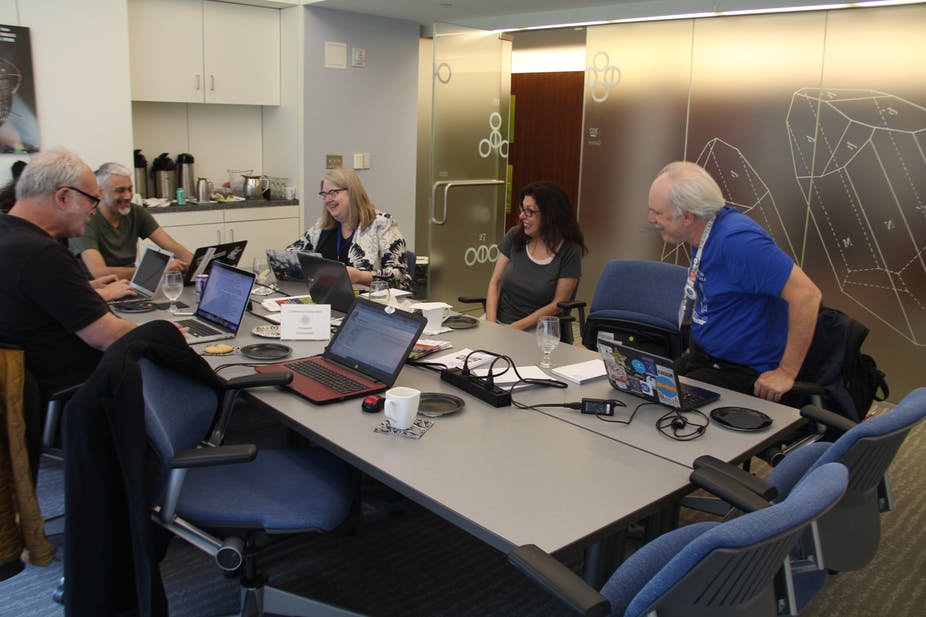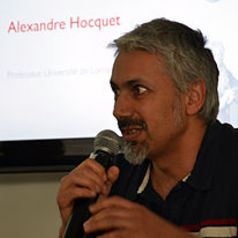While on a fellowship at Philadelphia’s Science History Institute, I worked for the first time with a “Wikipedian in residence”, Mary Mark Ockerbloom. I am assisting her with the monthly WikiSalons organized at the institute, and we are both imagining ways of improving Wikipedia on topics that are of concern to the institute’s research fellows.
Faithful to the spirit of Creative Commons, this interview draws upon an interview that previously appeared in “Distillations”, the Science History Institute’s magazine and podcast, kindly released under a CC-BY-SA-3.0 license.
Q: What do you do as Wikipedian in residence (WiR) at the Institute?
A: I write new Wikipedia articles on the history of science and improve existing ones, and I release images that are public domain or for which the Institute owns the copyright. I also do outreach in the broader Philadelphia and Wikipedia communities. When I first started working here, a number of people were concerned about releasing images under a creative commons license for general use, but over time, people have become more accepting and even enthusiastic about the idea. The digital initiatives team did a lot of work as they developed our new digital archive, with the result it has become accepted policy of the Institute to release materials from their digitized archive under a CC-BY-SA 3.0 license where possible.
Q: How did you get interested in this kind of work?
A: In the early 2000s I created a website called A Celebration of Women Writers to combat the lack of information about women authors online. Readers wrote to me suggesting writers and works to add, and I often recommended that they create Wikipedia pages about them. Eventually I began to edit Wikipedia myself. In 2006, when I created my first article, Harriet A. Roche, there were fewer Wikipedia guidelines. As first written, that article would never have passed the new article requirements that are in place today. It had no sourcing and no standardized formatting. Thankfully the people who reviewed it made helpful changes. I’ve gone back and improved it several times since then. It’s a good example both of how an article can develop and how Wikipedia’s standards have developed.
Q: How has the field changed over the years?
A: As more people have added content to the site, Wikipedia has created more rules to filter out poor-quality content. Wikipedia uses a system of checks and balances to try to stop inaccurate, unimportant, biased, and promotional content from being put on the site. One of the things that worries me is the potential for misinformation and bias to go undetected. Wikipedia relies on the assumption that people with a range of opinions and expertise will work on articles and that they will collaborate and resolve their differences of opinion. The hope is that the resulting article will be balanced and complete, but that can only happen if people with varying perspectives engage productively with the information in the article and with each other.
Wikipedia tracks all changes and contributors and that transparency makes it easier to see what’s happening. Wikipedia is a great platform for teaching people skills of fact-checking and digital literacy that can be applied everywhere, not just on Wikipedia. People need to think critically about the materials that they read and ask themselves, “Who said this? What is the original source of this information? Does the source really say what it is claimed to say? Are there possible biases in what’s written or Is relevant information not being addressed? Is the information both accurate and up-to-date?”
Q: What types of institutions have hired Wikipedians in residence?
A: Each Wikipedian in residence position is unique, a collaboration between the host institution and the Wikipedian involved. That said, my impression is that there have been more WiR positions in Europe than in the United States, and that European WiR have tended to focus on the release of public domain images, rather than on editing content. That may reflect perceived mission, types of collections, and copyright issues. A collection of older artworks may focus on image release. Institutions with an interest in science may see improving written content as important to their mission.
There’s ongoing discussion in the Wikipedia communities about the role of WiR. One question is whether a WiR should edit content at all. Many WiR don’t edit as part of their job. Those who do are likely to work for organizations interested in STEM [science, technology, engineering and mathematics] as well as GLAM [galleries, libraries, archives and museums]. The recently created Wikimedians in Residence Exchange Network (WREN) is a Wikimedia user group to support collaboration among WiR and advocacy as a group.
Q: There is a recurring debate about the issue of “paid editing” within the community. How do the Wikipedians in residence handle the issue? Do they receive negative feedback from some Wikipedians?
A: There is a very legitimate concern on Wikipedia that someone who is being paid to edit will edit in a biased way. The term paid editing is often used but conflict-of-interest editing is more accurate. It applies to editors who attempt to manipulate the information on Wikipedia to introduce bias and advance the interests of a specific person or institution. A congressional staffer might remove criticism of members of congress, or a PR firm might promote the products of its clients, or a scammer might try to extort money by offering to “protect” articles that might otherwise be deleted. In all these cases, an editor is putting the interests of someone who will benefit from the presence of biased information ahead of the interests of Wikipedia and its readers who benefit from unbiased information. This is a violation of Wikipedia’s terms of use.
A Wikipedian in residence can be paid and still edit in a way that provides unbiased, accurate information. The mission of Wikipedia and the mission of cultural institutions like the Science History Institute are not at odds. Both see the provision of good information as important. The test that I use in deciding what to edit as a WiR is the same one I use for personal editing: is there a potential conflict of interest? If I’m not the person I’m writing about; I’m not paid by the person or institution I’m writing about, and I didn’t write the source that I’m citing, there’s no conflict.



 Instagram Outage Disrupts Thousands of U.S. Users
Instagram Outage Disrupts Thousands of U.S. Users  Baidu Approves $5 Billion Share Buyback and Plans First-Ever Dividend in 2026
Baidu Approves $5 Billion Share Buyback and Plans First-Ever Dividend in 2026  Alphabet’s Massive AI Spending Surge Signals Confidence in Google’s Growth Engine
Alphabet’s Massive AI Spending Surge Signals Confidence in Google’s Growth Engine  Weight-Loss Drug Ads Take Over the Super Bowl as Pharma Embraces Direct-to-Consumer Marketing
Weight-Loss Drug Ads Take Over the Super Bowl as Pharma Embraces Direct-to-Consumer Marketing  American Airlines CEO to Meet Pilots Union Amid Storm Response and Financial Concerns
American Airlines CEO to Meet Pilots Union Amid Storm Response and Financial Concerns  SpaceX Prioritizes Moon Mission Before Mars as Starship Development Accelerates
SpaceX Prioritizes Moon Mission Before Mars as Starship Development Accelerates 
































